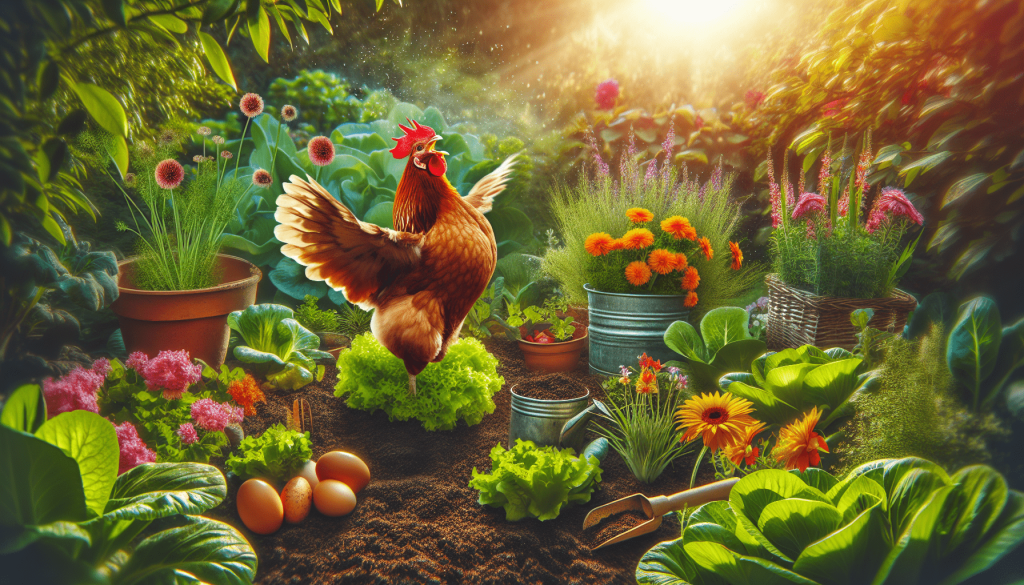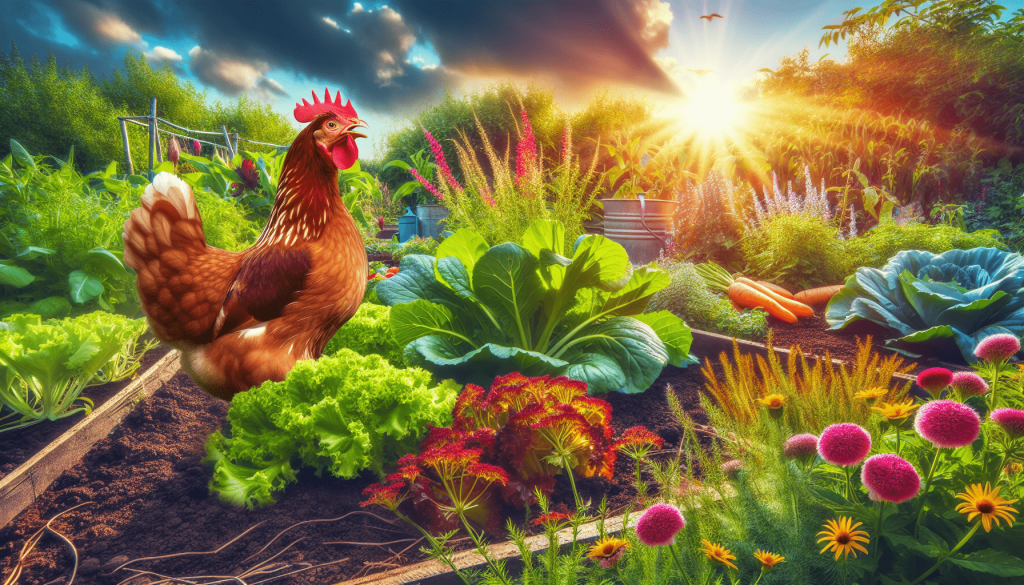This post may contain affiliate links. As an Amazon Associate, we may earn commissions from qualifying purchases.
Welcome to the world of blending gardening with poultry rearing! In “Integrating Chickens into Your Garden for Effective Pest Control and Fertilization,” you will discover how to seamlessly incorporate chickens into your gardening routine to tackle pests and enhance soil quality. By following a few straightforward strategies, you can let your feathered friends roam your garden, where they’ll feast on harmful insects and naturally fertilize your soil with their droppings, leading to a healthier, more vibrant garden. Have you ever considered enlisting some feathered friends for your gardening tasks? You might be surprised to learn how integrating chickens into your garden can provide effective pest control and natural fertilization. By allowing chickens to roam and forage, you’ll essentially be developing a symbiotic relationship where both your garden and the chickens benefit.
Benefits of Integrating Chickens into Your Garden
Embracing the presence of chickens in your garden brings a myriad of advantages that can fundamentally transform how your garden operates.
Natural Pest Control
Chickens have an insatiable appetite for insects, pests, and small creatures that typically plague gardens. Just imagine how much time and effort you’ll save as these natural exterminators hunt down everything from beetles to slugs. Not only will you reduce pest populations, but you’ll also lessen the need for chemical pesticides, leading to a healthier environment for both your plants and the greater ecosystem.
Organic Fertilization
Chickens are essentially little fertilizer factories. Their droppings are rich in nitrogen, phosphorus, and potassium—key nutrients that plants need to thrive. When chickens roam freely, their manure gets evenly distributed, enriching your soil naturally and efficiently. This means you’ll save on commercial fertilizers while boosting your garden’s fertility.
Weed Control
Another unsung benefit of chickens is their penchant for pecking at weeds and seeds. Letting chickens roam in areas with young weeds can drastically reduce unwanted plant growth. While they may not eliminate all weeds, they can significantly mitigate the problem, making your gardening chores much lighter.
Preparing Your Garden for Chickens
Before integrating chickens, it’s essential to prepare your garden to ensure both your plants and your chickens will thrive.
Choosing the Right Chicken Breed
Not all chicken breeds are created equal. Some are better suited for certain environments and purposes than others. Let’s take a look at some popular breeds ideal for pest control and fertilization.
| Breed | Pest Control Ability | Egg Production (per year) | Characteristics |
|---|---|---|---|
| Rhode Island Red | Excellent | 250 – 300 | Hardy, Docile |
| Buff Orpington | Good | 200 – 280 | Friendly, Gentle |
| Sussex | Excellent | 250 – 300 | Curious, Active |
| Australorp | Good | 250 – 300 | Hardy, Adaptable |
| Leghorn | Average | 280 – 320 | Active, Flighty |
Fencing and Protection
You’ll need to strategize to protect both your chickens and your garden. Fencing is crucial to keep the birds in designated areas and to protect them from predators. Use sturdy materials like welded wire or hardware cloth for fencing and ensure it extends a few inches into the ground to deter digging predators.
Garden Layout
Designate specific areas where chickens can roam freely and others that need protection. Raised beds and chicken-proof fencing around delicate plants can go a long way. Rotational grazing can also be implemented to periodically move chickens from one garden section to another, allowing the soil in different areas to recover and thrive.

Best Practices for Integrating Chickens into Your Garden
Now that your garden is prepped, let’s dive into best practices to make the most out of your garden-chicken integration.
Timing is Everything
Chickens can be more harmful than helpful during certain stages of plant growth. For instance, they’ll happily peck at your seedlings and newly sprouted plants, so it’s best to keep them away during these vulnerable phases. Introduce chickens to garden areas after harvesting is done to let them clean up any remaining pests or fallen fruits.
Controlled Access
Establish zones and set up gates or mobile fencing to control where the chickens can go. This helps prevent over-foraging and allows for a more controlled distribution of manure. Rotating these zones will keep both soil and chickens healthy.
Supplemental Feed
While chickens can find a lot of their nutritional needs in a well-maintained garden, it’s important to continue providing a balanced diet. Layer feeds, grit, and shell supplements keep chickens healthy and productive.
Seasonal Considerations
Your approach to integrating chickens will vary across seasons. Here’s a seasonal guide to help you navigate these changes effectively.
Spring
Spring is planting season, and this is probably when you’ll need to restrict chicken access the most. Use wire mesh or small fences to protect young plants until they are large and sturdy enough to tolerate chicken foraging.
Summer
During summer, chickens can be a great asset as they feast on insects that proliferate during this season. Make sure they have plenty of shade and fresh water to stay cool.
Fall
Fall is harvest time, and as you clear out old crops, let the chickens in to clean up pests and fertilize the soil. This is also an excellent time to allow them to forage as the ground will have plenty of fallen fruits and insects.
Winter
Winter can be harsh, and chickens will need protection from the cold. Create a designated winter run and provide ample bedding. Their movement and the manure they produce during this time will help maintain soil fertility for the next planting season.

Integrating Chickens Without Damage to Your Plants
Underestimating the potential harm chickens can do to your garden is a common mistake. Here’s how to integrate them without jeopardizing your plants.
Raised Garden Beds
Raised beds are excellent for protecting delicate and newly planted crops. Chickens can easily be kept away by the structure of the raised beds.
Chicken Tractors
Chicken tractors are movable chicken coops with open bottoms, allowing chickens to forage on fresh ground every few days. This method keeps the chickens from staying in one spot too long, thus preventing them from over-foraging any particular area.
Companion Planting
Companion planting with chicken-friendly and repellant plants can further ensure your garden’s health. For example, chickens tend to avoid strong-scented herbs like rosemary and sage, which can be strategically planted to deter them from specific areas.
Making the Most Out of Chicken Manure
Chicken manure is a rich, natural fertilizer, but using it effectively requires some care.
Composting Chicken Manure
Fresh chicken manure is “hot,” meaning it contains high levels of nitrogen that can burn plants. Composting allows the manure to break down and mature, making it safe and highly beneficial for your garden soil. Create a separate compost bin for chicken waste and allow it to decompose over several months before using it in your garden.
Direct Application
In certain scenarios, you can apply manure directly, particularly in the form of “chicken tea.” Steep chicken manure in water for a few days, dilute it, and then use it as a liquid fertilizer around established plants.
Chicken and Plant Symbiosis
Creating an environment where chickens and plants benefit mutually is the ultimate goal.
Fodder Plots
Consider growing specific plots of grains or greens devoted to chicken foraging. This offers chickens extra nutrition and keeps them from over-foraging your main crops.
Cover Crops
After harvesting, plant cover crops that are beneficial for soil health and can be foraged by chickens. Examples include clovers and rye grass, which chickens love and will enrich the soil as green manure.
Common Challenges and Solutions
Every rose has its thorn, and integrating chickens into your garden isn’t without challenges. Here are some common problems and their solutions.
Predation
Predators are a significant concern. Ensuring your chicken coop and garden fencing are secure can mitigate most predation risks.
Over-foraging
Over-foraging can harm your garden’s vegetation. Rotational grazing and controlled access, as mentioned earlier, can help prevent this.
Health Issues
Chickens are susceptible to various health issues. Regular health checks, clean living conditions, and a balanced diet are crucial for a healthy flock.
Conclusion
Integrating chickens into your garden for pest control and fertilization offers incredible benefits with some thoughtful planning and strategic implementation. From choosy breeds to seasonal considerations, and from managing manure to ensuring plant protection, these steps pave the way for a harmonious garden enriched by the industrious efforts of your feathered friends.
So take the plunge! Embrace the clucks and pecks, and unlock a garden that’s both productive and naturally balanced. Your plants will thank you, and your chickens will have a field day—literally.








